Pennsylvania Supreme Court Limits Certificate of Merit Rule
Pennsylvania Supreme Court Limits Certificate of Merit Rule only to Plaintiffs Who Are Asserting Claims Against Professionals Who Provided Services Directly to Them
The Pennsylvania Supreme Court, in Bruno v. Erie Ins. Co., decided on December 15, 2014, and provided an extensive review of the case law and legislative history of the Certificate of Merit Rule, P.R.C.P. 1042.3. The Plaintiffs in Bruno brought suit against their homeowners’ insurer and an engineer that was retained by the insurer, for damages based on the recommendation provided by the engineer that mold found during renovations at their home was harmless. The Trial Court held that the Plaintiffs were required to submit a Certificate of Merit to support their claims against the engineering professional retained by their insurer. The Supreme Court held that the plain language of the Rule, along with the legislative history, did not require Plaintiffs to submit the Certificate of Merit and held that, “a certificate of merit is not, therefore, required for professional liability actions brought by plaintiffs who are not patients or clients of a licensed professional.”
The limited reading of the Rule will affect defense of many types of cases, for instance, cases where licensed professionals are named by Plaintiffs in personal injury claims that occur on or near a construction site. The Plaintiff in such a case can name the architect or engineer for the site without submitting a Certificate of Merit.




